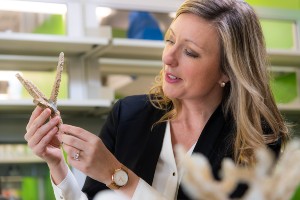Science Talks Webinars

Science Talks: Urban planning: Building climate-resilient communities through adaptation planning
While climate change is a global issue, impacts are felt locally. Local governments (municipalities) are well situated to lead climate adaptation action, however a variety of challenges slow adaptation implementation in practice. Hear from Jeff Birchall, assistant professor in the Department of Earth & Atmospheric Sciences, as he highlights some of the localized impacts associated with climate change, and the way local government decision-makers cope with these impacts, whether through ad-hoc planning, strategic long-term policy, or in some instances, no action at all. Showcasing examples from across Canada, this presentation demonstrates that action isn’t always straightforward, and buy-in for action isn’t always a guarantee, even when extreme events take place on a regular basis, and even when these impacts have a cost on the community.
S. Jeff Birchall, PhD, RPP, MCIP, is an associate professor of local-scale climate change adaptation/ resilience, in the School of Urban and Regional Planning, University of Alberta, where he serves as Director of the Climate Adaptation and Resilience Lab, and Lead of the UArctic Thematic Network on Local-scale Planning, Climate Change and Resilience.
Tuesday, June 24 | 12:00-1:00pm
Recent Webinars
Science Talks: Human-Centred Privacy in a Digital Society
Data isn't just a collection of numbers—it's something deeply connected to real people, whose lives can be affected by how companies use their information. Privacy-enhancing technologies (PETs) are designed to mitigate privacy risks in digital systems. When applied to data analysis, PETs can help strike a balance between protecting individual privacy rights and supporting companies' economic interests. However, for PETs to truly improve the landscape of corporate data-sharing practices, they must also foster trust among those whose data is being shared. Hear from Bailey Kacsmar on the development of privacy enhanced data analysis techniques, the implications on user perspectives of the space, and the ongoing work towards the development of accessible human-centred private data analysis techniques and protocols.

Science Talks: Environmental Chemistry: Safeguarding our Indoor Air
Breathing is fundamental to life, and most of us spend the vast majority of our time indoors. But have you ever stopped to consider what’s in the air we breathe inside our homes, workplaces, and schools? Maintaining clean indoor air is essential for protecting our health and well-being. However, indoor air quality is influenced by a mix of pollutants from both indoor activities and outdoor sources. Everyday actions, such as cooking or using certain appliances, can release pollutants into our living spaces. Meanwhile, outdoor air pollution—like wildfire smoke—can seep indoors, compounding the problem.
Join award winning chemist and faculty member Ran Zhao as he introduces key indoor air pollutants, with a spotlight on fine particulate matter, which poses significant health risks. He’ll share insights from two recent research projects and highlight the innovative use of low-cost air quality sensors that make these studies possible and show how science can help us breathe easier.
Science Talks: Protecting our oceans: Alien invaders and how to stop them
“Biological invasions” are a global problem created by people intentionally and unwittingly moving flora and fauna into environments where they don’t belong. This talk will explore the causes and consequences of 'biological invasions’, a global problem created by people intentionally and unwittingly moving flora and fauna into environments where they don’t belong. Today, thousands of invasive species threaten biodiversity and disrupt societies globally, and the problem is expected to intensify as our global climate continues to change. In searching for solutions, the talk will highlight innovative ways that communities are dealing with invasive species– from designing robots to creating cookbooks– and defending nature and local livelihoods in the process.
Join faculty member and Canada Research Chair in Aquatic Global Change Ecology and Conservation, Stephanie Green explain what invasive species are, why they are a problem and how they relate to our global and local communities, here in Edmonton, and what can be done to defend against invasive species and conserve threatened ecosystems.
Previous Webinars
Quantum Materials: From exotic particles to new technologies
Cannabis use in the modern era: The highs and lows
Artificial Intelligence - What can language models tell us about the brain?
Climate change on Canada's highest peak
Software Development - Building Better Code through Reuse
Rural Sustainability in Alberta with Bob Summers
Keeping hives alive: Behavioural defence of honey bees against disease with Olav Rueppell
Electric potential: Extracting lithium from waste in Alberta with Dan Alessi
Chasing a cure: New tools in the fight against COVID-19 with Fred West
Brain immune cells - the new frontier in neurodegeneration with Matthew Macauley
ARCHIVES
May: Sleep to remember with Clayton Dickson
April: The Evolution of Ethics in AI with Eleni Stroulia and Nidhi Hegde
February: COVID-19 modelling demystified with Marie (Betsy) Varughese and Michael Li
January: Fostering coexistence over conflict with urban coyotes through evidence-based methods with Colleen Cassady St. Clair
December: Taking Control of the Quantum World: Developing new technologies using ultracold atoms with Lindsay LeBlanc
November: Data permutations: How to understand human speech, the spread of COVID-19, and the Alberta electorate with Adam Kashlak
October: Searching for life outside of Earth: NASA’s Mars 2020 Perseverance Rover Mission with Chris Herd
September: Eavesdropping on communication in wild bats and mice with Matina Kalcounis-Rueppell
August: Community Approaches to Housing Affordability with Joshua Evans
July: The science of Rock, Paper, Scissors with Ben Dyson
June: Perspectives from new Canadian Arctic Ice Cores with Alison Criscitiello
May: Cretaceous Dinosaurs in Northern Alberta with Corwin Sullivan
April: Glycomics- Sugars and Human Health with Lara Mahal

